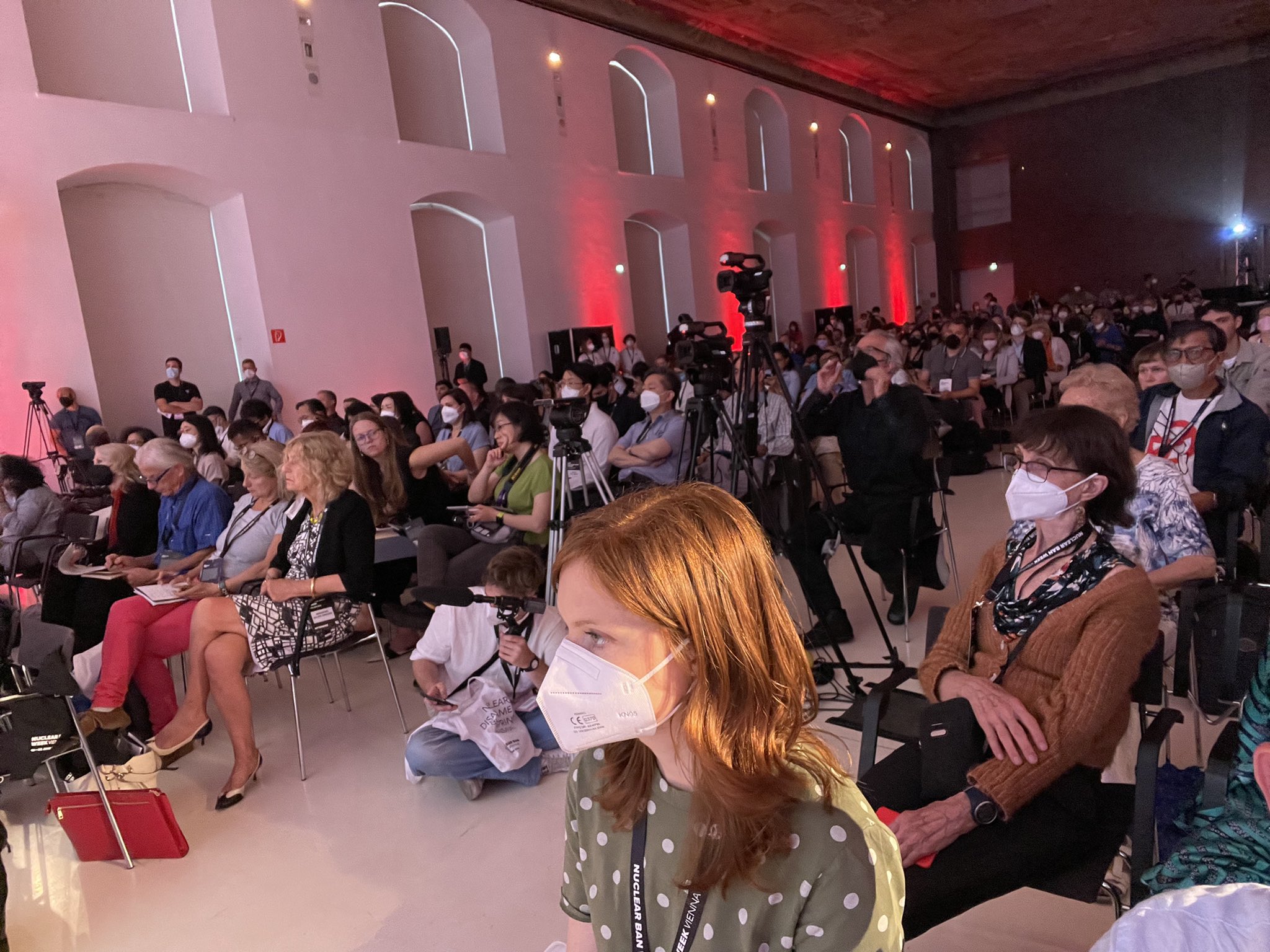CAMPAIGN NEWS:
Sachertorte #2: Nuclear Ban Forum (Day 2)
Sachertorte: a famous Viennese chocolate cake. Easier to eat than to pronounce correctly. Used here to provide a slice of the action for the Treaty on the Prohibition of Nuclear Weapons in Vienna, Austria.
Sunday 19 June
ICAN Nuclear Ban Forum Day 2
Report by Marlon Morice, student at the University of Melbourne and intern with ICAN Australia.
Vienna Hub – Live from South Australia
Day two’s proceedings kicked off in a decidedly homegrown setting, with Aunty Sue Coleman-Haseldine, Karina Lester, and Mia Haseldine – three generations of activists – addressing the Forum via livestream from Port Augusta in South Australia. Karina spoke of her family’s history of activism on the issue of nuclear weapons testing in Australia, and talked about the importance of sharing stories about the testing and its legacy. She told the forum of how communities were not informed about the tests, and that they never consented to them. Finally, she noted that while the history of nuclear testing on Indigenous land may be painful, the truth of what happened in South Australia and around the globe must be told.
Aunty Sue said that she can see the consequences of nuclear testing in her own family, including genetic mutations and physical deformities. She also expressed solidarity with victims of nuclear testing around the world, noting that if we forget the past, we will be doomed to repeat it. Mia shared her heartbreaking experiences with the legacy of nuclear testing, feeling compelled to continue the fight alongside her family and community. In particular, she argued for more research into the effects of nuclear testing on genetic diseases, as well as the impact on food and water supplies in remote communities. Aunty Sue, Karina and Mia all advocated for greater education on the history of nuclear testing and its impacts – including in First Nations’ languages – as people have a right to know how they can and have been affected by nuclear contamination. They also called for Australia to sign and ratify the TPNW.
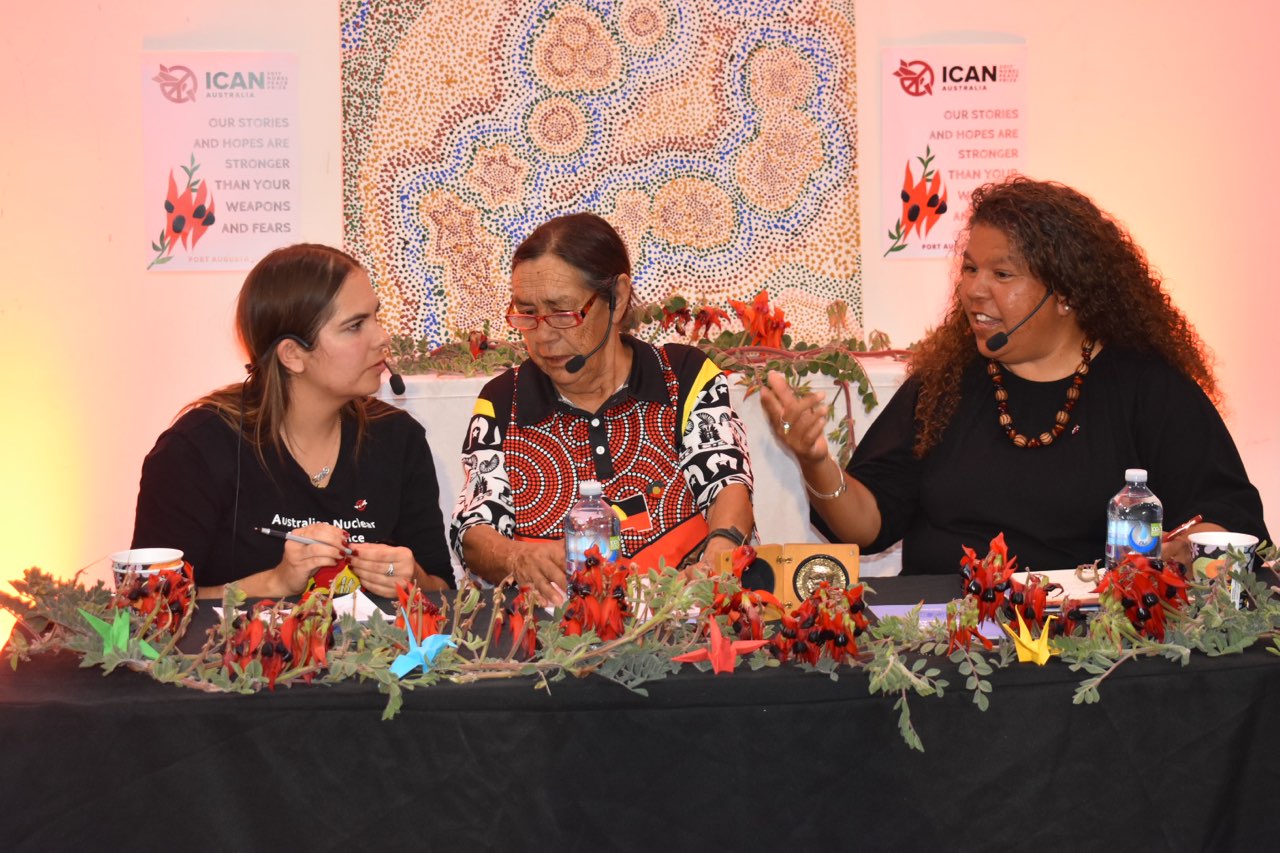
Vienna Hub – Live from Hiroshima and Nagasaki
Following this, we heard from campaigners and survivors from Hiroshima and Nagasaki. We were shown a video on Atomic Bomb Microcephaly, a condition caused by in-utero exposure to high levels of radiation, causing intellectual and physical disabilities – for which there is no cure. It demonstrated the enormous difficulties for sufferers and their families associated with the long-term effects of radiation exposure.
From Hiroshima, we heard from survivors of the atomic bomb. Hiroe Kawashimo, of the Association of Atomic Bomb Microcephaly Sufferers and Their Families, has no sight in her right eye, no hearing in her right ear, has intellectual impairments and is undergoing treatment for Thyroid abnormalities. She draws pictures and authors poems of her experiences – thinking of how much she hates war, and the devastation it brings to people. Another survivor, Toshiko Tanaka, expressed hope for a nuclear-free future, saying that:
“Today, the entire world is being threatened by the countries that have nuclear weapons. They threaten us. Our thoughts become frozen, and peace seems to be far away. But whatever difficulties we may face, I join my young friends and continue calling for a world without nuclear weapons. I hope this meeting of the State Parties to the TPNW will give us new input and energy so we can move forward. My young friends, I believe you will carry on our messages and deliver olive branches of peace to every corner of the world.”
Next, we were shown a video featuring the testimonies of Chieko Iwanaga and Takeo Hamada, survivors of the bombing of Hiroshima, on their horrifying experiences, and in particular their fight for recognition by the Japanese Government as Hibakusha (Hiroshima Survivors). Recognition as Hibakusha, and the support this entails, is determined by arbitrary administrative lines, not by the lived experiences of survivors. They spoke of their long court battles, along with nearly four hundred other survivors seeking recognition of their status.
From Nagasaki, we listened to an address by Hibakusha Sumiteru Taniguchi, who unfortunately passed away in 2017. He implored non-nuclear states to “besiege” nuclear weapons states to push them to dismantle their weapons, and ensure they can never be used again. Campaigners in Nagasaki expressed their desire that their city be the last to experience the horrors of nuclear weapons. We also heard again from Chieko Iwanaga, who addressed MSP delegates, saying that “nuclear weapons threaten our ability to love each other, our capability to love ourselves.” The experiences of victims in Hiroshima and Nagasaki show the inhumanity of nuclear weapons, the irreversibility of their effects, and the urgency of the fight for their abolition.
Main Stage – Building Justice Through the Law
On the Main Stage, meanwhile, was a discussion on how international law can hold nuclear weapon norm-breakers to account. The conversation featured Seth Shelden, UN Liaison for ICAN and forum MC; Dr Olamide Samuel, Research Associate of Nuclear Politics at the University of Leicester; Bonnie Docherty, Associate Director of Armed Conflict and Civilian Protection with the Human Rights Clinic at Harvard University; and Colin Namalambo, a diplomat for the Namibian Ministry of Foreign Affairs. The speakers highlighted the importance of justice to international law on nuclear weapons, as well as the issue of inequality between states, as well as vulnerable communities. Addressing these challenges can enhance the legitimacy and authority of international law, improving compliance by state parties.
Namalambo spoke about the process of denuclearisation on the African Continent, and in particular the success of the Treaty of Pelindaba, which created the African Nuclear-Weapon-Free Zone. He also pointed out that such regional and bilateral agreements should be complemented by effective action at the global level through the TPNW. Docherty discussed the issue of accountability, highlighting both political accountability, which seeks to condemn the use of WMDs such as nuclear weapons in all forms, as well as individual criminal responsibility, noting that there are many avenues to pursue justice in this regard, including the International Criminal Court, or ad-hoc commissions created under international law. Dr Samuel argued that international law can influence state behaviour in subtle and un-recognised ways, and that it is important to imagine a world without international law to fully appreciate its effects. The speakers concluded with the point that international treaties, such as the TPNW can influence all countries, not only those who are party to the treaty – with the pressure growing with each new participant. They provided the example of the Convention on Cluster Munitions, which has seen a dramatic reduction in their usage.
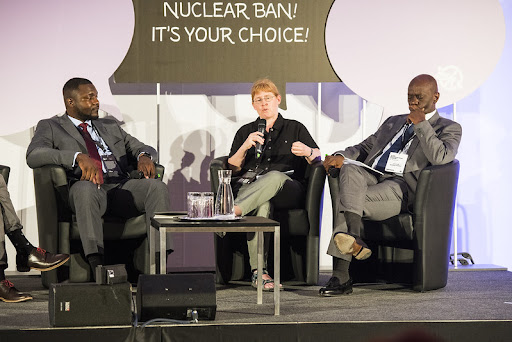
Image: (from left) Dr Olamide Samuel, Bonnie Docherty, and Colin Namalambo
Main Stage – The Ban is the Plan, and This is Why
The subsequent panel discussed how to engage stakeholders on the path to nuclear disarmament. It featured Phil Twyford, New Zealand Minister for Disarmament and Arms Control; Tommy Piemonte, Head of Sustainable Investment Research for the Bank für Kirche und Caritas; and Elayne Whyte, former Costa Rican ambassador to the UN, who successfully presided over the TPNW negotiations in 2017. Minister Twyford noted that the TPNW came about through the “winning formula” of an alliance between diplomats and activists. He also pushed for a broad, multi-level coalition for the abolition of nuclear weapons, including diplomats, scientists, financiers, faith communities, and to also tap into the energy of anti-colonial, anti-racist and social justice movements. Piemonte presented his perspective as a financial actor, arguing that it is important to deny abusers and non-ethical governments the financial and economic resources that fund their activities. He believes that the TPNW should become the new standard by which financial actors such as banks and pension funds make investment decisions. Ambassador Whyte applauded the new generation of activists and campaigners, expressing her belief in the “strong health” of the movement to sign and ratify the TPNW. She concluded that from survivors of nuclear weapons we must learn conviction, resilience, and perseverance, while we must also learn the value of articulation, coalition-building, and strategising from organisations such as ICAN.
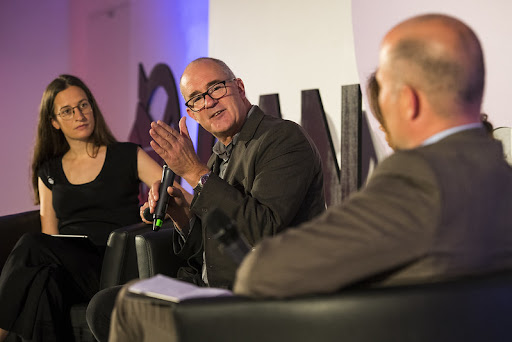
Image: Moderator Nadja Schmidt with Phil Twyford
Main Stage – Meeting States Parties
The next conversation featured ICAN Social Media Officer Venessa Hanson, and Alexander Kmentt, the President-designate of the MSP. Hanson spoke about the intersectionality of her advocacy, which spans the issues of nuclear weapons, racism, colonialism, and inequality, as well as the importance of the participation of young people in decision-making to effectively harness their energy and enthusiasm. Kmentt highlighted the humanitarian impulses of the TPNW, and his enthusiasm for its positive obligations as a driver of state action. He believes that the TPNW can draw discussion away from limited dialogue frameworks of security. However, he also warned that we are approaching a “threshold moment” with the intersection of the crises of Climate Change, the COVID-19 Pandemic and the proliferation of nuclear weapons which threatens to spiral out of control without action at the international level.
Vienna Hub – Impunity Hides Behind Nuclear Weapons
Back over at the Vienna Hub, we heard an enlightening discussion between Terrell Starr, a Ukraine-based journalist and Pavel Podvid, a physicist and expert on Russian nuclear forces. Podvid talked about the current state of Russia’s nuclear arsenal, and the impacts of its ongoing invasion of Ukraine. He argued that there is a significant amount of “unhelpful analyses” on the use of tactical nuclear weapons that in fact legitimise them and of the right of countries such as Russia to use nuclear weapons. It can therefore become a self-fulfilling prophecy. Podvid also discussed bilateral arms control prospects between the U.S. and Russia, arguing that the US should commit to unilateral arms reductions, including of its nuclear stockpile to maintain momentum on arms control despite current political headwinds.
Vienna Hub – Workshop on Preparing for the MSP
Here, ICAN Policy and Research Coordinator Alicia Sanders-Zakre and ICAN Australia’s own Tim Wright discussed the policy issues that will be discussed at the upcoming MSP, as well as some tips for advocates and campaigners at such significant events.
The MSP will require declarations from states parties on their current nuclear status, and will feature a discussion on the critical condition of universality to promote more states to sign and ratify the TPNW. Two important deadlines will also need to be decided – the date by which a nuclear weapons state will need to fully dismantle their stockpiles (Sanders-Zakre provided the timeframe of around 10 years), as well as the deadline for states to remove nuclear weapons on a host state’s territory (expected to be around 90 days). The MSP will also feature discussions on Articles 6 and 7, which provide for assistance to victims of nuclear testing as well as remediation of affected environments. Further, the MSP will consider how states should implement their international obligations under the TPNW into national law. Sanders-Zakre also noted that the MSP will need to undertake the process of establishing a Competent International Authority, responsible for overseeing the disarmament process, as well as a Scientific Advisory Board to provide technical assistance, advice, and research on behalf of state parties. Delegates must also set out an agenda for inter-sessional work to determine how states will continue to meet after the MSP to maintain momentum and continue nuclear disarmament work. Finally, Sanders-Zakre suggested that the MSP will feature a discussion on complementarity to dispel the narrative that the TPNW is not consistent with existing arms control and prohibition treaties.
Wright noted that the MSP is the moment when the treaty “comes alive,” and that it must produce an effective action plan for the future to improve compliance and gain new participants. He suggests that threats by Vladimir Putin to use nuclear weapons was many people’s first experience with a direct threat of nuclear war, and that this can provide urgency to grow the nuclear abolition coalition. Wright also lauded the large number of campaigners who will be in attendance, and highlighted the effort to support the participation of campaigners and activists from the Pacific, Latin America, and Africa. He recommended that advocates be mindful of who they approach at large events such as the MSP, as it may be more appropriate that delegates interact with campaigners from their home country. Moreover, it is important to build on the energy of the MSP back home, as it is this time that is most crucial in maintaining momentum for change.
Main Stage – Seize the Moment, Sustain the Momentum
The final panel of the Forum was on the subject of making change, identifying opportunities for change, and how to maintain hope in the face of adversity. It featured four speakers from a range of backgrounds – Emma Belcher, President of the Ploughshares Fund; Rev. Karlene Griffiths Sekou, a human rights activist; Canadian Senator Marilou McPhedran; and Brian Fitzgerald, the Director of Dancing Fox, an activist creative agency.
Belcher shared three conditions for when she believes gradualist approaches are no longer sufficient. First, when there is a harmful and suborn status quo – such as when narratives of nuclear deterrence are becoming more entrenched. Second, when gains are being eroded, and finally when there is a sense of urgency brought on by a crisis. Rev. Griffiths Sekou shared her perspective that we should view ‘moments’ for change only as single points in a larger journey that spans multiple movements and generations, and that she looks to the history of resistance against slavery and hierarchy for inspiration to keep fighting for social justice. Senator McPhedran spoke of her faith in the lawmaking process, and of entrenching policy gains in law. Fitzgerald presented his unique perspective of understanding activism in creative terms, arguing that we should take on the framework of improvisation (to have a mindset of “yes, and,” rather than of “no”). He also expressed his belief that we should develop the skills to better describe the previous victories of the anti-war and social justice movements to sustain future momentum and inspire future advocates. When faced with the backsliding of gains, the speakers advocated to not give up, to agitate, organise, look to past victories for inspiration and to prepare for the next crisis.
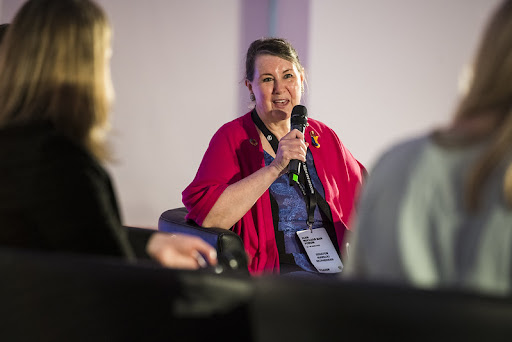
Image: Canadian Senator Marilou McPhedran
Main Stage – Choosing the End of Nuclear Weapons
The Forum concluded with a series of commitments by advocates and campaigners from partner organisations, setting out how they would contribute to the blueprint for disarmament. To present only a few examples , Alimzhan Akhmetov, from Kazakhstan, pledged to encourage other countries in Central Asia to sign and ratify the TPNW; Peace Boat’s Matsumura Masumi committed to collaborate with other industries and movements, to improve outreach to children and students, and to promote employment for young people in peacemaking roles; and finally, Ben Donaldson of the UK United Nations Association vowed to raise awareness in the UK of the legacy of its nuclear testing on communities and the environment.
And with that, the ICAN Nuclear Ban Forum comes to a close. Our eyes now turn to the Conference on the Humanitarian Impact of Nuclear Weapons, which aims to raise the world’s attention to the grave humanitarian consequences and risks of nuclear weapons.
